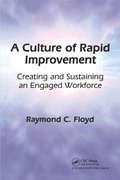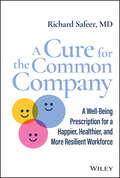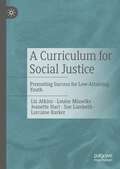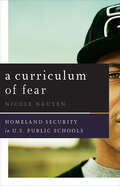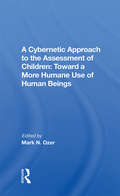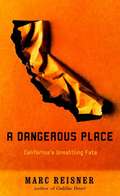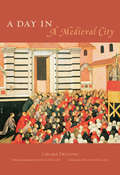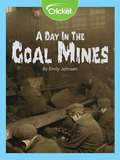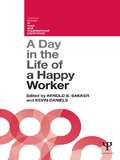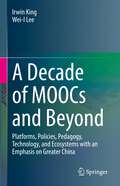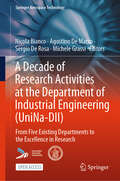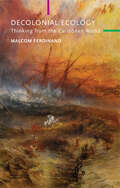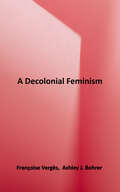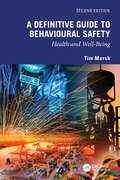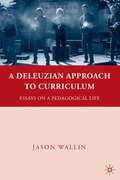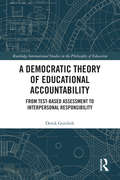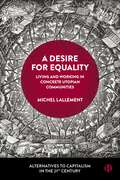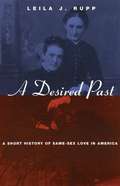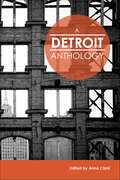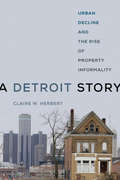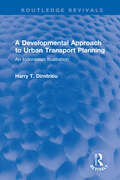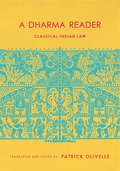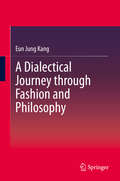- Table View
- List View
A Culture of Rapid Improvement: Creating and Sustaining an Engaged Workforce
by Raymond C. FloydBecome a corporate change agent Learn to implement and cultivate a culture of improvement with the assistance of one of the world’s most respected experts Managing a business so that it achieves a supreme pace of improvement requires that all members of an organization can and do make their best contributions to the success of the enterprise. Management must provide employees with a shared set of values and beliefs so that they can decide for themselves how to behave in accordance with the expectations of a nurturing and empowering culture. A Culture of Rapid Improvement is intended for those leaders seeking to encourage dramatic improvement within their organizations. It shows these change agents how they can— · Develop the shared values and beliefs that serve as the foundation for a dynamic culture · Engage all employees to join the new culture and provide opportunities for these stakeholders to initiate and participate in improvement · Measure, evaluate, and manage the performance of the new culture Filled with lessons garnered from practical examples, this text is based on Raymond C. Floyd's 40 years of industrial management experience, including his more than 20 years at Exxon Mobil. He is the winner of a Shingo Prize and also holds the unique distinction of having led businesses from two different industries that were both recognized by IndustryWeek magazine as being among the Best Plants in America. If you approach the task of improvement with proper action and full participation, improvement is not just possible, but inevitable. At six months, you will notice a difference in your organizational culture; at the end of two years, you will be operating with near–world-class performance.
A Cure for the Common Company: A Well-Being Prescription for a Happier, Healthier, and More Resilient Workforce
by Richard SafeerMake your workforce happier, healthier—and more productive—with strategies from a world-leader in company culture and health In A Cure for the Common Company: A Well-Being Prescription for a Happier, Healthier, and More Resilient Organization, health and well-being expert, Richard Safeer, M.D. delivers a step-by-step roadmap to creating a culture of health on your team and in your company that keeps your people happier and more engaged. In the book, you’ll discover the importance of shaping your well-being culture, challenging yourself, your team, and your workforce to live better lives by offering them new tools and methods to do just that. This book discusses: Bulletproof strategies to help leaders build a sound cultural foundation that supports their efforts at change A path forward that allows organizational leaders to step up and help their employees be the best versions of themselves Techniques to build a supportive culture that overcomes common obstacles to change, including positive social climates, norms, and peer supports A can't-miss resource for business and human resource leaders at medium- to large-sized organizations, A Cure for the Common Company also belongs on the bookshelves of every professional interested in supporting employee health and well-being.
A Curriculum for Social Justice: Promoting Success for Low-Attaining Youth
by Liz Atkins Louise Misselke Jeanette Hart Sue Lambeth Lorraine BarkerThis book reports the outcomes of a research project which involved developing and implementing a research-informed curriculum for low-attaining further education students. Key aims of the curriculum were to ameliorate some of the social and educational disadvantages faced by the students, and to support secure and sustainable transitions to employment or further education. The book begins by outlining the characteristics of the lowest-attaining young people and considering the challenges they face. Subsequent chapters describe the educational and geographic contexts, the curriculum, and the pedagogical approaches adopted. It moves on to describe the outcomes of the project, drawing on narratives of individual students and staff to illustrate the benefits of a broader curriculum which acknowledges earlier disadvantage. The book concludes with a discussion of how the curriculum could be adapted in different contexts and considers the implications of such change in terms of policy, practice, future research and social justice.
A Curriculum of Fear: Homeland Security in U.S. Public Schools
by Nicole NguyenWelcome to Milton High School, where fear is a teacher&’s best tool and every student is a soldier in the war on terror. A struggling public school outside the nation&’s capital, Milton sat squarely at the center of two trends: growing fear of resurgent terrorism and mounting pressure to run schools as job training sites. In response, the school established a specialized Homeland Security program. A Curriculum of Fear takes us into Milton for a day-to-day look at how such a program works, what it means to students and staff, and what it says about the militarization of U.S. public schools and, more broadly, the state of public education in this country. Nicole Nguyen guides us through a curriculum of national security–themed classes, electives, and internships designed through public-private partnerships with major defense contractors like Northrop Grumman and federal agencies like the NSA. She introduces us to students in the process of becoming a corps of &“diverse workers&” for the national security industry, learning to be &“vigilant&” citizens; and she shows us the everyday realities of a program intended to improve the school, revitalize the community, and eliminate the achievement gap. With reference to critical work on school militarization, neoliberal school reform, the impact of the global war on terror on everyday life, and the political uses of fear, A Curriculum of Fear maps the contexts that gave rise to Milton&’s Homeland Security program and its popularity. Ultimately, as the first ethnography of such a program, the book provides a disturbing close encounter with the new normal imposed by the global war on terror—a school at once under siege and actively preparing for the siege itself.
A Cybernetic Approach To The Assessment Of Children: Toward A More Humane Use Of Human Beings
by Mark OzerThis collection addresses the application of the principles of cybernetics to the methodology of assessment of function in children. The authors suggest that an awareness of the issues of control and informational feedback exemplified by cybernetics leads to new ways of thinking about both the process of gathering data and the type of data sought.
A Dangerous Place: California's Unsettling Fate
by Marc ReisnerMarc Reisner, the author of Cadillac Desert, the classic history of the American West and its fatal dependence on water, returns to the subject that never ceased to seduce him: California. Writing with his signature command of his subject and with compelling resonance, Reisner leads us through California's improbable history and rise from a largely desert land to the most populated state in the nation, fueled by an economic engine more productive than all of Africa. Reisner believes that the achievement of this, the last great desert civilization, hinges on California's denial of its own inescapable fate. Both the Los Angeles and San Francisco Bay areas sit astride two of the most violently seismic zones on the planet. The earthquakes that have already rocked California were, according to Reisner, mere prologues to a future cataclysm that will result in destruction of such magnitude that the only recourse will be to rebuild from the ground up. Reisner concludes A Dangerous Place with a hypothetical but chillingly realistic description of such a disaster and its horrifying aftereffects.
A Day in a Medieval City
by Chiara FrugoniA Day in a Medieval City breathes life into the activities of the city streets, homes, fields, schools, and places of worship. With entertaining anecdotes and gritty details, it engages the modern reader with its discoveries of the religious, economic, and institutional practices of the day. From urban planning and education to child care, hygiene, and the more leisurely pursuits of games, food, books, and superstitions, Frugoni unearths the daily routines of the private and public lives of citizens.
A Day in the Coal Mines
by Emily JohnsenDo you ever wish that you didn't have to go to school? Not if you had been born during the Industrial Revolution.
A Day in the Life of a Happy Worker
by Edited by Arnold B. Bakker Kevin DanielsThis edited collection brings together some of the leading researchers in the study of the daily experience of work and daily well-being. The book covers both theoretical and methodological issues involved in studying workers’ well-being as it evolves on a daily basis. Interest in the topic of daily fluctuations in worker well-being has grown rapidly over the past ten years. This is partly because of advances in research and statistical methods, but also because researchers have found that the psychological processes that influence well-being play out from moment to moment, and from day to day. Topics covered in this book include: The theoretical basis of studying work as a series of daily episodes Assessment of different components of daily well-being Factors involved in the regulation of well-being at work Qualitative and quantitative diary experience sampling and event reconstruction methods Latent growth curve modelling of diary data The final chapter of the book includes a preview of how daily methods may evolve in the future. Intended as a guide for researchers with good knowledge of field research methods, the book will be particularly useful to researchers of work-related phenomena who seek to expand their knowledge of dynamic methods in field contexts, and those who want to start using these methods. It will also be of interest to students of work psychology and organisational behaviour, and related disciplines.
A Death in Texas: Race, Murder and a Small Town's Struggle for Redemption
by Dina Temple-RastonFrom the initial investigation through the trials and their aftermath, A Death in Texas tells the story of the infamous Byrd murder as seen through the eyes of enlightened Sheriff Billy Rowles. What he sees is a community forced to confront not only a grisly crime but also antebellum traditions about race. Drawing on extensive interviews with key players, journalist Dina Temple-Raston introduces a remarkable cast of characters, from the baby-faced killer, Bill King, to Joe Tonahill, Jasper's white patriarch who can't understand the furor over the killing. There's also James Byrd, the hard-drinking victim with his own dark past; the prosecutor and defense attorneys; and Bill King's father, who is dying of a broken heart as he awaits his son's execution.
A Decade of MOOCs and Beyond: Platforms, Policies, Pedagogy, Technology, and Ecosystems with an Emphasis on Greater China
by Irwin King Wei-I LeeThis book is an academic publication about the global development of massive open online courses (MOOCs) and major MOOC platforms worldwide in the past decade, as well as the outlook of MOOCs in the future, with an emphasis on Greater China. The book also discusses the upsurge of the demand for online learning and MOOCs during the COVID-19 pandemic.The book is divided into three main parts - Part I: Overview of MOOCs introduces the origin and history of MOOCs and the development of MOOC platforms in Greater China and the global context; Part II: Key Issues discuss the MOOC policies, innovative pedagogy, technology, and ecosystems worldwide; and Part III: Beyond MOOCs probes into the roles and benefits of MOOCs in times of crises, as well as the outlook of MOOCs in the future. In terms of topic diversity, the book contains a comprehensive investigation of the past and latest MOOC developments, extracting and elaborating on relevant information regarding platforms, policies, pedagogy, technology, and ecosystems. Subsequently, in-depth analyses of MOOC data are utilized to deduce the current trends related to the MOOC movement and to extrapolate the likeliest direction of development for MOOCs in the years to come. The book can inform policymakers, education institutions, course instructors, platform developers, investors, researchers, and individual learners of MOOCs about critical information on the present and future of MOOC development, assisting them in making crucial decisions on what initiatives can optimize their advantages in the sector.
A Decade of Research Activities at the Department of Industrial Engineering: From Five Existing Departments to the Excellence in Research (Springer Aerospace Technology)
by Sergio De Rosa Nicola Bianco Agostino De Marco Michele GrassiThis open access book celebrates the decennial of the Department of Industrial Engineering of Università di Napoli Federico II, Italy. It covers the main research achievements developed at the department in the fields of aerospace, marine, energy, statistical, mechanical and management engineering. Five pre-existing departments merged in 2013, and the research results are here summarized to certify how important it was to join skills, expertise, and projects. The industrial engineering area is huge, but it is now dominated by the need to conceive and analyze new solutions, human and climate oriented to face with the actual challenges which dictate the new paradigm, which evolved from “is it feasible?” to “is it compatible with the environment and the human beings?”. There is still a lot to do, but the contents of this book demonstrate that the first steps have been done. All the researchers of the department have contributed to this book, more than 140 authors, and thus, it isthe collective outcome of the path they were able to perform all together, including administrative officers and technicians. It highlights the international relevance and multidisciplinarity of research at the university as well as the planned research lines for the next years.
A Decade of Upheaval: The Cultural Revolution in Rural China (Princeton Studies in Contemporary China #12)
by Andrew G. Walder Dong GuoqiangA revealing exploration of political disruption and violence in a rural Chinese county during the Cultural RevolutionA Decade of Upheaval chronicles the surprising and dramatic political conflicts of a rural Chinese county over the course of the Cultural Revolution. Drawing on an unprecedented range of sources—including work diaries, interviews, internal party documents, and military directives—Dong Guoqiang and Andrew Walder uncover a previously unimagined level of strife in the countryside that began with the Red Guard Movement in 1966 and continued unabated until the death of Mao Zedong in 1976.Showing how the upheavals of the Cultural Revolution were not limited to urban areas, but reached far into isolated rural regions, Dong and Walder reveal that the intervention of military forces in 1967 encouraged factional divisions in Feng County because different branches of China’s armed forces took various sides in local disputes. The authors also lay bare how the fortunes of local political groups were closely tethered to unpredictable shifts in the decisions of government authorities in Beijing. Eventually, a backlash against suppression and victimization grew in the early 1970s and resulted in active protests, which presaged the settling of scores against radical Maoism.A meticulous look at how one overlooked region experienced the Cultural Revolution, A Decade of Upheaval illuminates the all-encompassing nature of one of the most unstable periods in modern Chinese history.
A Decolonial Ecology: Thinking from the Caribbean World (Critical South)
by Malcom FerdinandThe world is in the midst of a storm that has shaped the history of modernity along a double fracture: on the one hand, an environmental fracture driven by a technocratic and capitalist civilization that led to the ongoing devastation of the Earth’s ecosystems and its human and non-human communities and, on the other, a colonial fracture instilled by Western colonization and imperialism that resulted in racial slavery and the domination of indigenous peoples and women in particular. In this important new book, Malcom Ferdinand challenges this double fracture, thinking from the Caribbean world. Here, the slave ship reveals the inequalities that continue during the storm: some are shackled inside the hold and even thrown overboard at the first gusts of wind. Drawing on empirical and theoretical work in the Caribbean, Ferdinand conceptualizes a decolonial ecology that holds protecting the environment together with the political struggles against (post)colonial domination, structural racism, and misogynistic practices. Facing the storm, this book is an invitation to build a world-ship where humans and non-humans can live together on a bridge of justice and shape a common world. It will be of great interest to students and scholars in environmental humanities and Latin American and Caribbean studies, as well as anyone interested in ecology, slavery, and (de)colonization.
A Decolonial Feminism
by Françoise VergèsWinner of an English PEN Award 2021! "A feminist narrative of how decolonization is a never-ending struggle!"—Veronica Gago, co-author of A Feminist Reading of Debt For too long feminism has been co-opted by the forces they seek to dismantle. In this powerful manifesto, Francoise Verges argues that feminists should no longer be accomplices of capitalism, racism, colonialism, and imperialism: it is time to fight the system that created the boss, built the prisons, and polices women’s bodies. "This text was written from a particular position: from within the current struggle for total liberation, from a long commitment to anti-patriarchal, anti-racist, anti-capitalist, and anti-imperialist struggle, and a long engagement with feminist theory and practices…" A Decolonial Feminism grapples with the central issues in feminist debates today: from Eurocentrism and whiteness, to power, inclusion, and exclusion. Delving into feminist and anti-racist histories, Verges also assesses contemporary activism, movements, and struggles, including #MeToo and the Women's Strike. Centering anticolonialism and anti-racism within an intersectional Marxist feminism, the book puts forward an urgent demand to free ourselves from the capitalist, imperialist forces that oppress us.
A Definitive Guide to Behavioural Safety: Health and Well-Being, Second Edition
by Tim Marsh‘Behavioural safety’ or behaviour-based safety (BBS) has been around as a concept for several decades and is commonly held to mean directly tackling the frontline behaviours that lead to incidents and injury. Unfortunately, virulent criticism of some approaches of BBS frequently generalises to all others, so that commentators don’t know if they are arguing or agreeing. This book aims to cut through the waffle to be the one-stop guide to all the core theories and principles that underpin behaviour-based safety. In this second edition, internationally acclaimed behavioural safety expert Tim Marsh leads the reader through the three main strands: The awareness approach, the ‘walk-and-talk’ approach, and the Six-Sigma safety or the Deming-inspired ‘full’ approach that covers the systemic approach to safety observation, measurement, intervention, and analysis, but also incorporates emotional intelligence training aimed at enhancing supervisor-worker trust and communication more generally. Updated to reflect systemic changes due to the COVID-19 pandemic and featuring a brand-new chapter on well-being that discusses the massive changes in thinking about the interaction of culture and personal safety that have occurred since the previous edition was published. This book allows the reader to set up an ambitious and wide-ranging behavioural safety programme from scratch or refresh their current approach. Written by one of the world’s leading BBS experts, including leading the first major research project on the applied use of BBS outside of the US, based on the author’s experiences with more than 400 organisations Delivered in an accessible and popular writing style that simplifies complex theory and arguments in a user-friendly way, plus features end-of-chapter checklists to underpin learning Possesses a post-COVID focus, bringing behavioural safety into the 2020s, and covers the growing concept of well-being in a brand-new chapter. The title features end-of-chapter checklists to confirm understanding of the concepts. A Definitive Guide to Behavioural Safety is the go-to book for any practicing occupational health and safety professional.
A Deleuzian Approach to Curriculum
by Jason J. WallinThis work examines the impoverished image of life presupposed by the legacy of transcendent and representational thinking that continues to frame the limits of curricular thought. Analyzing the ways in which modern institutions colonize desire and overdetermine the life of its subject, this book draws upon the anti-Oedipal philosophy of Gilles Deleuze, revolutionary artistic practice, and an unorthodox curriculum genealogy to rethink the pedagogical project as a task of concept creation for the liberation of life and instantiation of a people yet to come. This book invites academics, artists, and graduate students to engage the contemporary struggles of curriculum theory, educational philosophy, and pedagogical practice with a new set of conceptual tools for thinking radical difference.
A Democratic Theory of Educational Accountability: From Test-Based Assessment to Interpersonal Responsibility (Routledge International Studies in the Philosophy of Education)
by Derek GottliebThis insightful text offers a detailed account of the historical development of educational accountability in the US public education system. In doing so, it diagnoses the unforeseen consequences arising from a centralized, technocratic implementation of the concept, and calls for a radical re-thinking in how our democratic responsibilities translate into the provision, measurement, and conceptualization of education. Drawing from the works of scholars including Stanley Cavell, Linda Zerilli, Daniel Koretz, and James Scott, A Democratic Theory of Educational Accountability illustrates the way in which "educational accountability" has foregrounded centralized measures of "success" to the point of perversity. Through nuanced political theory and philosophical arguments, the text demonstrates how test-based measures have rendered the holistic aims of education futile, resulting in an education system of "box-checking" and "rule-following". Ultimately calling for a new imagination of how our democratic responsibilities are enacted in schools and communities, Gottlieb illustrates how accountability can be used for good, to ensure that our schools nurture talent, cultivate social mobility, and engage with local needs. This text will be of great interest to graduate and postgraduate students, researchers, academics, and libraries in the field of philosophy of education, educational policy, assessment & testing and democratic theory.
A Desire for Equality: Living and Working in Concrete Utopian Communities (Alternatives to Capitalism in the 21st Century)
by Michel LallementSince the late 1960s, individuals rebelling against societal norms have embraced intentional communities as a means to challenge capitalism and manifest their ideals. Combining archival work with an ethnographic approach, this book examines how these communities have implemented the utopias they claim to have in their daily lives.Focusing primarily on intentional communities in the United States who have adopted egalitarian principles of life and work, notably Twin Oaks in Virginia, the author examines the lives and actions of members to further understand these concrete utopias. In doing so, the book demonstrates that intentional communities aren't relics of a bygone era but rather catalysts capable of shaping our future.
A Desired Past: A Short History Of Same-Sex Love In America
by Leila J. RuppWith this book, Leila J. Rupp accomplishes what few scholars have even attempted: she combines a vast array of scholarship on supposedly discrete episodes in American history into an entertaining and entirely readable story of same-sex desire across the country and the centuries.
A Detroit Anthology (Belt City Anthologies)
by Anna Clark&“This anthology of prose, poetry, and essays is written by . . . [a] wide ethnic array of voices that truly shows the facets of Detroit life.&” —Ebony Magazine A unique perspective of the Motor City, this anthology combines stories told by both longtime residents and newcomers from activists to teachers to artists to students. While Detroit has always been rich in stories, too often those stories are told back to the city by outsiders looking in, believing they can explain Detroit back to itself. As editor, Anna Clark writes in the introduction, &“These are the stories we tell each other over late nights at the pub and long afternoons on the porch. We share them in coffee shops, at church social hours, in living rooms, and while waiting for the bus. These are stories full of nodding asides and knowing laughs. These are stories addressed to the rhetorical &‘you&’—with the ratcheted-up language that comes with it—and these are stories that took real legwork to investigate . . . You will not find &‘positive&’ stories about Detroit in this collection, or &‘negative&’ ones. But you will find true stories.&” Featuring essays, photographs, art, and poetry by Grace Lee Boggs, John Carlisle, Desiree Cooper, Dream Hampton, Steve Hughes, Jamaal May, Tracie McMillan, Marsha Music, Shaka Senghor, Thomas J. Sugrue, and many others. &“Offers from-the-heart and on-the-ground views of life in America&’s Motor City.&” —The Boston Globe &“A thrilling success. It gives voice to people who now live or once lived in this fascinating, tortured place, the survivors, good people who know what pain is, people who understand that the city exerts an undying pull on them.&” —The Millions
A Detroit Story: Urban Decline and the Rise of Property Informality
by Claire W. HerbertBringing to the fore a wealth of original research, A Detroit Story examines how the informal reclamation of abandoned property has been shaping Detroit for decades. Claire Herbert lived in the city for almost five years to get a ground-view sense of how this process molds urban areas. She participated in community meetings and tax foreclosure protests, interviewed various groups, followed scrappers through abandoned buildings, and visited squatted houses and gardens. Herbert found that new residents with more privilege often have their back-to-the-earth practices formalized by local policies, whereas longtime, more disempowered residents, usually representing communities of color, have their practices labeled as illegal and illegitimate. She teases out how these divergent treatments reproduce long-standing inequalities in race, class, and property ownership.
A Developmental Approach to Urban Transport Planning: An Indonesian Illustration (Routledge Revivals)
by Harry T. DimitriouOriginally published in 1995, this monograph examines a developmental approach to urban transport planning, with reference to Indonesia. It provides a profile of the country, outlining Indonesia’s geography and population, historical and political background, economic profile and constraints on development. Recent trends in Indonesian development are outlined. Indonesian urban transport demand and supply are analysed, and policy and planning frameworks for urban transport set out, including national policy and financial and institutional issues. Factors affecting urban transport are considered such as settlement characteristics and matching of transport systems with settlement hierarchy. The applicability of a developmental approach to urban transport planning for Indonesia is analysed with reference to experience in industrialized nations and the Third World.
A Dharma Reader: Classical Indian Law (Historical Sourcebooks in Classical Indian Thought)
by Patrick OlivelleWhether defined by family, lineage, caste, professional or religious association, village, or region, India's diverse groups did settle on a concept of law in classical times. How did they reach this consensus? Was it based on religious grounds or a transcendent source of knowledge? Did it depend on time and place? And what apparatus did communities develop to ensure justice was done, verdicts were fair, and the guilty were punished?Addressing these questions and more, A Dharma Reader traces the definition, epistemology, procedure, and process of Indian law from the third century B.C.E. to the middle ages. Its breadth captures the centuries-long struggle by Indian thinkers to theorize law in a multiethnic and pluralist society. The volume includes new and accessible translations of key texts, notes that explain the significance and chronology of selections, and a comprehensive introduction that summarizes the development of various disciplines in intellectual-historical terms. It reconstructs the principal disputes of a given discipline, which not only clarifies the arguments but also relays the dynamism of the fight. For those seeking a richer understanding of the political and intellectual origins of a major twenty-first-century power, along with unique insight into the legal interactions among its many groups, this book offers exceptional detail, historical precision, and expository illumination.
A Dialectical Journey through Fashion and Philosophy
by Eun Jung KangThis book takes an in-depth look at the integration of fashion and philosophy. It challenges the deeply rooted prejudice or misconception that fashion is a field limited to body-oriented and appearance-related themes and practices. It also reveals that fashion is intermeshed with distinctively modern issues that belong to the realm of the mind as well as the body. In doing so, it refashions philosophy and philosophizes fashion, which ultimately amount to the same thing. The book argues that while the philosophization of fashion can give a clearer understanding of some esoteric areas of philosophy and fashion’s close connection to modern societies and politics, it also shows that philosophy can assist in redeeming fashion from the objective, bodily world, positioning it as an indispensable part of the humanities. This is because fashion manifests critical aspects of human culture in our time, and is an expression of the zeitgeist, which is interwoven with the unfolding of history. This book will be highly relevant to students and researchers in fashion studies who are looking for the theoretical underpinnings and insights for their own work. It will also be of keen interest to scholars in the field of philosophy who are seeking to apply philosophical concepts to both everyday life and our empirical world.
